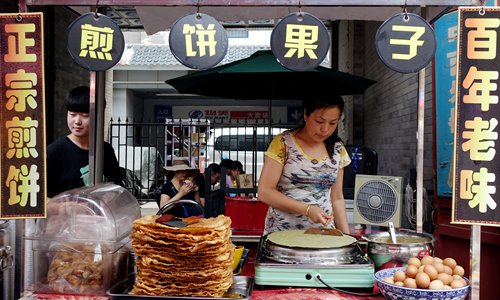HOME >> CHINA
Beijing strengthens street food management to boost safety
By Zhang Han Source:Global Times Published: 2019/6/28 18:33:04

A woman makes and sells pancakes at an outdoor booth in North China's Tianjin Municipality. Photo: VCG
Beijing's new food safety regulations effective Monday will regulate the sale of street food, in an attempt to improve food safety in the city.
According to the newly laid down directives, mobile street stalls can no longer sell food items like precooked cold meat, raw aquatic food and unpacked wine, while small grocery stores are not allowed to cook food on site and sell them. The new directives were posted on Beijing Municipal Administration for Market Regulation's website.
On the other hand, food-processing workshops can from now on only make the approved categories of food and are prohibited from catering food products to any third-party vendor, said the regulation.
Grocery stores will not be allowed to cook and sell food in the near future, as their food processing certificates will not be renewed, according to the new regulation.
The regulations aim to manage small-scale food production and improve the overall food safety in Beijing, reported the Xinhua News Agency. The regulations were proposed and passed in December 2018.
As of early 2018, Beijing has more than 300,000 street food venders, 46,000 food booths and 97 small food workshops. Accidents stemming from faulty food safety mechanism caused by such small-scale business practitioners accounted for a quarter of total mishaps, Xinhua reported.
Some Beijing residents expressed their concerns that the new regulations may affect the pancake and stuffed bun shops, convenient breakfast places for many.
However, officials said that the convenient food booths that usually sell breakfast are categorized as small restaurants and will not be affected, The Beijing News reported on Friday.
All the small shops and vendors are closely related to residents' daily life, the regulation of which is important for food safety, Zhu Lijia, a professor of public management at the Chinese Academy of Governance in Beijing, told the Global Times on Friday.
Implementation of the policy needs to strike a balance between convenience and regulation, Zhu said, noting small businesses are contributors to the dynamic metropolis economy and that local residents' interest will be respected.
A woman selling pancakes at Chaoyang district told the Global Times that "I think the regulations will rule out unlawful sellers and protect those who obey the standards and sell sanitized food."
Posted in: SOCIETY,CHINA WATCH